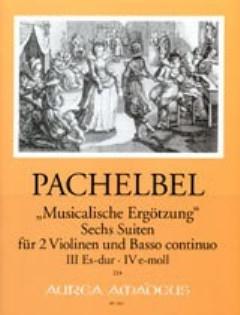Johann Pachelbel - Musicalische Ergötzung (2003)
Johann Pachelbel - Musicalische Ergötzung (2003)

(01) Partie I in F (sonata. allegro; allemand; courant; ballet - variatio; saraband; gigue) (02) Partie II in c minor (sonata; gavotte - variatio; trezza; aria; saraband; gigue) (03) Partie III in E flat (sonata. allegro; allemand; courant; gavotte; saraband; gigue) (04) Partie IV in e minor (sonata. adagio; aria; courant; aria; ciacona) (05) Partie V in C (sonata; aria; trezza; ciacona) (06) Partie VI in B flat (sonata. adagio; aria; courant; gavotte - variatio; saraband; gigue) Musica Antiqua Köln: Stephan Schardt - violin Reinhard Goebel - violin Klaus-Dieter Brandt - cello Léon Berben – harpsichord recorded: Sept 20, 2003, WDR-Funkhaus (Klaus-von-Bismarck-Saal), Cologne
The title of this release and the glowering skyscape on its cover are pure marketing – the piece from which the title comes is not about April weather at all – but I don’t think anyone lured by it into buying a disc of 17th-century chamber music need feel aggrieved. We don’t get enough reminders that Pachelbel was a real composer of quality chamber music, yet here is his complete Musikalische Ergötzung of 1695, consisting of six ‘Parthien’ (or suites) for two violins and continuo. Add in a seventh, unpublished suite, six secular songs and the Canon and Gigue, and these are ‘musical pleasures’ indeed.
If April is a red herring, the presence elsewhere in the artwork of Brueghel is more apt, for Pachelbel’s music has a strong sense of connection with the world. The songs deal feelingly with death, the perfidy of princes (that’s the April showers one), ‘Good Councillor Walther’ and a nameless patron, while the suites, for all their restless counterpoint, never lose touch with their grounded choreographic roots. Fine music, then, but not rarefied.
In Gli Incogniti it finds itself in expert hands. There is depth and sweetness to their sound, clarity and busyness to their counterpoint, and buoyancy to their expression of rhythm and line. They are as able to inhabit serious melancholy (in Partie IV for instance) as to access a sense of fun for dances such as the Aria of the ‘Partie a 4’ (to which they add a rat-a-tat finger-on-wood accompaniment) or in the occasional playful burst of pizzicato. Likewise, in the unassumingly strophic songs, they can quickly summon a mood, most movingly when viola-comforted death is the subject; Hans Jörg Mammel’s clear but plangent tenor helps, though I wish he had more ease of movement. The Canon is intelligently done, its slowly changing countenance subtly observed, and closing not in grandiose climax but gentle farewell. Less chiselled than London Baroque’s muscly 1994 recording, and more in tune than that of Les Cyclopes (7/95), this release is well worth your time. --- Lindsay Kemp, gramophone.co.uk
download (mp3 @VBR kbs):
yandex 4shared mega mediafire uloz.to cloudmailru gett
Zmieniony (Niedziela, 24 Wrzesień 2017 14:14)








